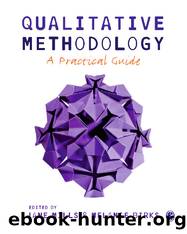Qualitative Methodology by Jane Mills Melanie Birks

Author:Jane Mills, Melanie Birks [Jane Mills, Melanie Birks]
Language: eng
Format: epub
ISBN: 9781446248980
Barnesnoble:
Publisher: SAGE Publications
Published: 2014-02-04T00:00:00+00:00
Activity 8.1 Distance in Time in Historical Research
What do you think of the suggestion that the historical researcher is at a disadvantage because of their inability to engage directly with their subject matter as a result of distance in time? Make a list of advantages and disadvantages that might result when a qualitative researcher is removed in time from the sources of their data.
Aligning Philosophy and Methodology with Purpose
The primacy of purpose, and the fundamental importance given to a substantive research interest, is a common characteristic of much historical research. Thus, notwithstanding those who consider the past as a repository of data to be used for testing a hypothesis, generating theory or trialling a concept, philosophy and methodology are typically subordinated to what the research question demands. An interest in women's experiences of, say, health care in late nineteenth century Europe, may require an examination of a large array of sources: medical records in a local hospital; surviving correspondence among women's advocates, nurses and/or midwives; diaries, memoirs and autobiographies of literate women; reports of government enquiries on public health; creative fiction in which the lives of women are represented in detail; records of political parties; documents of private health spas; advertisements for health products in the local press; pamphlets of charities; newsletters of religious groups; morbidity and mortality statistics; contemporary descriptions of medical practices; forms of clothing and styles of fashion; court records of unlicensed health practitioners prosecuted for malpractice â the list goes on, and is limited only by the imagination of the researcher.
Of course, that is not to say that all such sources are equally valuable (much less available and accessible), but it shows that when it comes to delineating potential sources for historical investigation, philosophical and methodological scruples tend to take second place to the underlying research interest. Refining that research interest into a focused research question shapes the enquiry and orients the researcher towards particular kinds of source materials. Crucially, such refinement also leads to a more precise formulation of the particular questions the researcher will put to her source materials, as any given set of documents or artifacts can be used in a multitude of ways. Thus the records of a Victorian hospital may not just tell us about the âthroughputâ of patients, but may also contain information about the then prevailing working practices of medics, nurses, and orderlies; medical authoritiesâ attitudes towards the poor; the relative extent of âmedicalizationâ and âmoralizationâ of individual ailments; the conceptual architecture of Victorian medicine; the management of gender within the hospital; and much more besides. Extracting information from such documents is thus largely a matter of asking the right questions of them. What questions are asked depends on the substantive interest of the enquiry. Thus the same set of documents will serve as evidence for someone interested in the operation of institutionalized health care as well as for someone researching the creation of modern medical hierarchies â the source materials in themselves do not specify how they may be used.
Download
This site does not store any files on its server. We only index and link to content provided by other sites. Please contact the content providers to delete copyright contents if any and email us, we'll remove relevant links or contents immediately.
Cecilia; Or, Memoirs of an Heiress — Volume 1 by Fanny Burney(32536)
Cecilia; Or, Memoirs of an Heiress — Volume 2 by Fanny Burney(31934)
Cecilia; Or, Memoirs of an Heiress — Volume 3 by Fanny Burney(31925)
The Great Music City by Andrea Baker(31911)
We're Going to Need More Wine by Gabrielle Union(19030)
All the Missing Girls by Megan Miranda(15921)
Pimp by Iceberg Slim(14476)
Bombshells: Glamour Girls of a Lifetime by Sullivan Steve(14046)
For the Love of Europe by Rick Steves(13854)
Talking to Strangers by Malcolm Gladwell(13339)
Norse Mythology by Gaiman Neil(13332)
Fifty Shades Freed by E L James(13227)
Mindhunter: Inside the FBI's Elite Serial Crime Unit by John E. Douglas & Mark Olshaker(9312)
Crazy Rich Asians by Kevin Kwan(9271)
The Lost Art of Listening by Michael P. Nichols(7485)
Enlightenment Now: The Case for Reason, Science, Humanism, and Progress by Steven Pinker(7303)
The Four Agreements by Don Miguel Ruiz(6739)
Bad Blood by John Carreyrou(6608)
Weapons of Math Destruction by Cathy O'Neil(6260)
